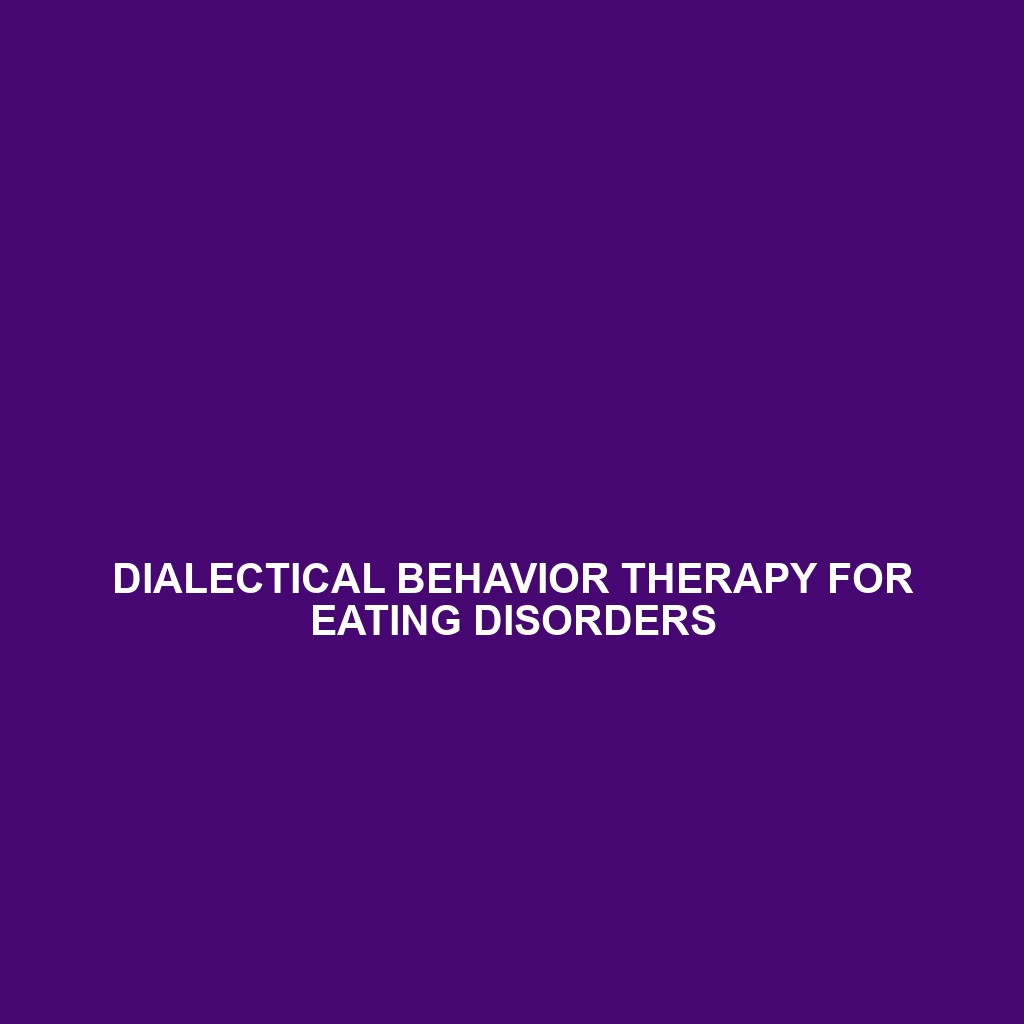Dialectical Behavior Therapy for Eating Disorders: A Comprehensive Overview
Overview
Dialectical Behavior Therapy (DBT) for Eating Disorders is an evidence-based therapeutic approach designed to help individuals struggling with disordered eating patterns and related mental health conditions. Developed by Dr. Marsha Linehan in the late 1980s for individuals with borderline personality disorder, DBT has evolved into a versatile treatment method that addresses various psychological issues, including eating disorders such as anorexia nervosa, bulimia nervosa, and binge-eating disorder.
The purpose of DBT in the context of eating disorders is to enhance emotional regulation, increase distress tolerance, and develop interpersonal effectiveness—all of which are crucial for individuals who experience extreme emotional reactions towards food and body image. By combining cognitive-behavioral techniques with mindfulness practices, DBT provides a structured framework that empowers individuals to change harmful behaviors and improve their overall well-being.
How It Works
Dialectical Behavior Therapy for Eating Disorders operates through a multi-faceted healing process that includes individual therapy, skills training groups, and phone coaching.
– Individual Therapy: During these sessions, clients work closely with trained DBT therapists to identify negative thought patterns and behaviors related to their eating disorders. The therapist helps clients develop personalized strategies to cope with triggers and urges.
– Skills Training Groups: DBT emphasizes the teaching of essential coping skills. These groups focus on four key areas:
– Mindfulness: Cultivating awareness of the present moment without judgment, particularly regarding thoughts and feelings associated with food and body image.
– Interpersonal Effectiveness: Developing communication skills to improve relationships and assert needs without resorting to unhealthy eating behaviors.
– Emotion Regulation: Learning to recognize, understand, and manage emotions in a constructive manner, which is crucial for addressing emotional eating issues.
– Distress Tolerance: Building resilience through strategies that allow individuals to cope with distressing situations without resorting to disordered eating behaviors.
– Phone Coaching: This feature allows clients to reach out to their therapist outside of scheduled sessions during moments of crisis. Phone coaching equips individuals with immediate support and guidance, fostering a more integrated approach to managing their eating disorders in real-life situations.
Through this structured methodology, DBT focuses on balancing acceptance with change, teaching clients to accept their current circumstances while motivating them to strive for improvement.
Benefits
Dialectical Behavior Therapy for Eating Disorders offers a range of significant benefits for individuals seeking recovery from disordered eating habits. These advantages include:
– Enhanced Emotional Regulation: Empowers clients to manage overwhelming emotions without turning to food.
– Improved Coping Mechanisms: Develops healthy coping strategies for handling stress, anxiety, and other triggers.
– Increased Self-Awareness: Encourages greater mindfulness about thoughts and feelings, fostering a deeper understanding of personal challenges.
– Better Relationships: Promotes improved communication and interpersonal effectiveness, enhancing personal and social relationships.
– Long-Term Recovery: Equips clients with tools that promote sustained behavioral change and prevent relapse.
– Customized Treatment Plans: Provides tailored approaches that meet individual needs and circumstances.
– Access to Professional Support: Offers ongoing access to mental health professionals who specialize in eating disorders.
Who It’s For
Dialectical Behavior Therapy for Eating Disorders is designed for various demographic groups, including:
– Teens and Young Adults: Adolescents and young people frequently face identity issues and societal pressures surrounding body image, making them particularly vulnerable to eating disorders.
– Adults: Individuals experiencing long-standing patterns of disordered eating, which may be exacerbated by life transitions or lifestyle changes.
– Individuals with Co-occurring Disorders: Those who struggle with both eating disorders and mental health issues such as anxiety, depression, or PTSD often benefit from this integrated approach.
– Family Members: DBT also involves family members in the treatment process, providing education and support to help them understand the challenges of their loved ones and foster a supportive environment for recovery.
By addressing the unique needs of these populations, DBT for Eating Disorders encourages a comprehensive recovery pathway.
Special Features
Here are several unique features that distinguish Dialectical Behavior Therapy for Eating Disorders from other therapeutic interventions:
1. Structured Skills Training: The inclusion of specialized skills groups ensures clients systematically learn essential coping strategies, making DBT both comprehensive and practical.
2. Emphasis on Mindfulness: DBT’s mindfulness practices are particularly effective in helping clients cultivate a non-judgmental awareness of their thoughts and feelings, which is crucial for managing eating disorders.
3. Collaboration with Other Treatments: DBT can be integrated with other therapeutic methodologies, such as nutritional counseling and medical management, offering a holistic approach to treatment.
4. Crisis Support: The availability of phone coaching provides immediate support during critical moments, helping clients navigate challenging situations that may trigger disordered eating behaviors.
5. Focus on Acceptance and Change: The dialectical approach balances acceptance of one’s current state with the motivation to pursue change, fostering a healthier mindset toward recovery.
Why Choose This Service
Dialectical Behavior Therapy for Eating Disorders is an innovative and comprehensive treatment option that stands out in the landscape of mental health services. By combining emotion regulation, mindfulness, and cognitive-behavioral strategies, this therapy provides individuals with the skills and support needed to reclaim their lives from the grips of eating disorders.
Choosing DBT means opting for a structured, multifaceted approach that recognizes the complexity of eating disorders. With a strong emphasis on building resilience, fostering self-awareness, and empowering interpersonal relationships, DBT offers clients the tools to not only confront their challenges but also thrive in their recovery journey.
In conclusion, if you or someone you know is struggling with an eating disorder, seek out the support of a qualified DBT program. This commitment to mental health can lead to healthier relationships with food, improved emotional well-being, and a fulfilling path forward. For more information about Dialectical Behavior Therapy for Eating Disorders, consider reaching out to a certified provider today.
